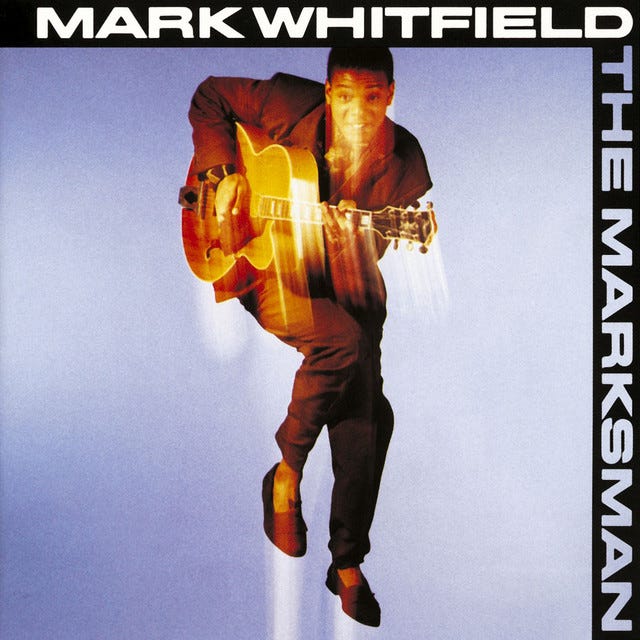Let me start this by saying that when The Marksman literally arrived on my doorstep, I knew absolutely nothing about jazz. I had dabbled in some fusion and more “modern jazz” from artists like Al Di Meola, Jaco Pastoruius and Chick Correa’s Elektric Band, but nothing traditional, certainly no hard bop. I wouldn’t have known it had you whacked me over the head with Giant Steps.
In truth, that type of jazz wasn’t exactly en vogue in the late ‘80s and early ‘90s, replaced by pop and electric versions of the genre, some good and some God-awful. To this day, when I mention I appreciate jazz, those who recoil rarely cite John Coltrane or Dizzy Gillespie as the reason, but instead the soulful sounds of Kenny G, God help us.
But even having limited knowledge, I was bop-curious. I had played in jazz band in high school and even did a few small gigs doing my best to sight read, but I’m guessing my swing sounded like a kid more into Dio than Charlie Parker because, well, I was.
Fortunately, I worked at a musical instrument store that a record label thought was a record store. I’ll explain.
Mistaken Identity
For half a decade while in college, I worked at a somewhat notorious music store on the north side of Houston called Texas Music Emporium. It was some of the best education in business and life I ever got thanks to my friend and owner Jim Cappiello.
At some point, the little “Music Store That Ate My Brain” began to be sent promotional material from Sony Records. None of us had any clue why that was, but we were happy to take the music, promo photos and occasional t-shirts that came with the deal.
For the most part, there wasn’t a ton to like. There was one group we all thought sounded like a late ‘70s rock band called Pearl Jam (I still have a bunch of their promo material from that packet of info on Ten), but that was about it until The Marksman arrived in the mail box.
(This album is listed on Warner Brothers, so no idea how we ended up with it given everything we got from Sony - let’s call it divine intervention).
Suffice it to say, no one in this music store filled with long-haired ‘80s musicians knew anything about jazz, nor did we care to, but something stuck with this record.
A Break from the Metal
Towards the end of another Saturday after hours of pained guitar distortion butchering “Sweet Child O’ Mine” in the back room (and metal music shredding PA speakers out front), someone got the bright idea to throw on the Mark Whitfield disc to see what it was and take a respite from the noise.
From what I recall, it was a bit like that scene in Tommy Boy when they came across a song by the Carpenters, both agreed it was lame, but soon found themselves singing it at the top of their lungs.
It was goddamn soothing and the guitar playing was advanced as fuck. For a bunch of dudes spending most of their time listening to Yngwie Malmsteen and other such silliness, this was a break for the ears without being a rest from the shredding.
Growing Up Whitfield
Eventually, I discovered jazz for real. It became (and remains) a large part of my listening. But, in many ways, I owe a debt of gratitude to Mark Whitfield and whoever the guy at the record label who didn’t know he was sending CDs into a void from whence they would never return. I might have discovered Miles Davis and McCoy Tyner and Sonny Rollins and many many others later, but maybe not?
In the case of The Marksman, it still holds up as a really enjoyable listen. The title track has the stone groove you hear on his other releases like 7th Ave. Stroll. And you can’t go wrong with Duke Ellington’s “In a Sentimental Mood” if you are a young jazz guitarist trying to make a name on your debut release.
He also works some other classics including “The Very Thought of You” by Nat King Cole and the standard “There is No Greater Love.” In truth, though, his compositions stand out, particularly “Medgar Ever’s Blues,” which was later covered by Whitfield’s contemporary, the great bassist Christian McBride. Those two would also collaborate on one of the coolest records you’ll ever dig - Fingerpainting: The Music of Herbie Hancock.
There’s a ton to love about The Marksman as an aficionado of music, particularly jazz, but, for me, it’s as much about the path it put me on as the music itself. Ultimately, it’s a very solid debut from a talented young (at the time) guitarist, but it isn’t Kind of Blue.
Then again, I may have never heard that Miles Davis tour de force without Whitfield’s first record. For that, I am forever grateful.
The Marksman (1990)
Track Listing:
The Marksman
The Blues, from Way Back
In a Sentimental Mood
A Long Way from Home
Medgar Ever’s Blues
Little Digi’s Strut
The Very Thought of You
Namu
There is No Greater Love



